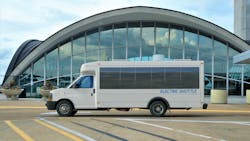St. Louis Lambert International Airport commissions Lighting eMotors for five Lightning ZEV4™ shuttle buses
The St. Louis Lambert International Airport (STL) purchased five Lightning ZEV4™ shuttle buses from Lightning eMotors. STL partner SP Plus Parking (SP Plus) will operate the vehicles, transporting passengers between the airport’s two terminals. The deal also includes five Level 2 chargers and one Level 3 DC fast charger, currently set for delivery later this year.
STL received a Federal Aviation Administration (FAA) 2023 Voluntary Airport Low Emissions Program (VALE) grant to help fund the purchase of the vehicles and chargers. The grants are only available for the purchase of FAA Buy American compliant vehicles. To ensure its customers could access some of the more than $5 billion in available FTA/FAA funding, Lightning has certified the ZEV4 product line to be both FAA Buy American and FTA Buy America compliant.
“Our team has worked hard to ensure our products meet the high standards required to receive any of the billions of federal dollars that are available to support the expansion of the EV ecosystem. This order is a great validation that our vehicles and charging technology are ideally suited to help airports achieve their business and environmental goals,” said Kash Sethi, chief revenue officer for Lightning eMotors. “As our first order purchased with funds from the FAA’s Buy American VALE funding program, it is a clear case study in why these grants are crucial to accelerating EV deployments at airports nationwide.”
“The Lightning ZEV4 will allow us to deliver EV shuttles to those that use St. Louis Lambert International Airport sooner,” said Rhonda Hamm-Niebruegge, STL’s airport director and CEO. “St. Louis Lambert International is committed to sustainable, clean energy practices and we’re excited for passengers to begin experiencing that firsthand with our new shuttles.”
The five Lightning ZEV4 cutaway vehicles are built on Lightning’s second generation, GM4500-based platform, and will be fitted with shuttle bodies. They are expected to travel 100 miles per shift, with at least one operating around the clock using the Lightning-supplied DC fast charger during charging breaks while the others will be used daily and charged overnight on Level 2 chargers. Lightning will also train local service providers to maintain the airport’s first EVs.
“This process will allow us to move from thinking green to being an airport that practices the green concept,” Hamm-Niebruegge said.
“Airports provide an ideal use case for electric commercial vehicle fleets, particularly when you couple accessible FAA funding with the real-world operating benefits of EVs. This is an exciting expansion of our airport customer base and we’re confident it’s just the beginning of our work with airports across the country,” Sethi said.
